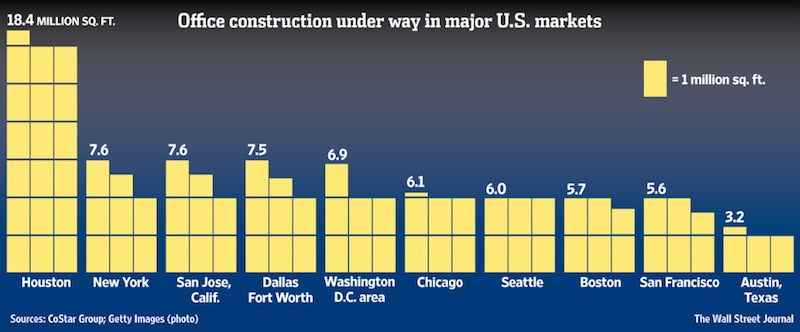A few days ago, The Wall Street Journal reported that one-sixth of all office space under construction nationwide is located in the Houston metropolitan area.
The Journal quoted the property data firm CoStar Group, which stated that by the end of 2014, 80 buildings with about 18 million sf of office space were started in Greater Houston.
This wouldn’t be earthshaking news—Houston, after all, continues to be one of country’s more vibrant markets, ranking 39th out of 300 of the largest metropolitan economies worldwide, according to the Brookings Institution’s Global MetroMonitor—were it not for the fact that all this office construction is occurring at a time when the price of oil—a commodity that helps lubricate Houston’s economic engine—has plummeted by more than 50% since last summer.
Several of the biggest energy companies have announced more than 30,000 layoffs worldwide, and a sizable number of those workers could be Houstonians. Fewer workers require fewer offices, and employers are already rushing to sublease the space they occupy, the Journal reports.
 Sources: WSJ, CoStar Group
Sources: WSJ, CoStar Group
In a follow-up story, the Journal reports that 13.2 million sf of office space are on schedule to be completed in 2015, the highest total since 1984.
CoStar now estimates that Houston’s vacancy rate could rise to 15.3% by 2016, from 10.8% at the end of 2014.
The newspaper singles out one development firm, Hines, that’s building a 48-story tower on spec, without tenants lined up, as an example of how certain companies suddenly find themselves exposed to a potential economic downturn. On the flip side, excess office space and higher vacancy rates could lead to lower rents, and opportunities to find existing space rather than building new.
HOUSTON NOT AS OIL DEPENDENT
But is Houston really headed for a fall? Not if you listen to some of the comments posted about the Journal article. One reader insisted that Houston is nowhere near as oil dependent as it was in the 1980s, when its housing market all but collapsed and nine of Texas’s 10 largest banks failed.
“Houston is twice as large as it was in 1980, and its dynamic economy is now twice as diversified,” one reader commented. “Also, the oil industry has fortified itself since 1980. Houston now boasts 11 major economic sectors in its massive economy.”
(Similar arguments about Louisiana’s supposedly more-diverse economy were made recently in an article published by The Advocate in Baton Rouge, La., which reported that only 13% of that state’s proceeds is now tied to mineral revenue, compared to 42% in the 1980s.)
A recent survey of Houston-area purchasing managers at 45 companies found that those not so tightly bound to oil prices—such as utilities and non-energy manufacturing—have seen a boost in new orders, production levels, and supplier purchases.
“We’ll have to see where things go in the next few months,” Ross Harvison, Chairman of the Institute for Supply Management-Houston Business Survey Committee, told the Houston Chronicle.
Even the Journal article acknowledges that any “bust” in Houston’s economy might turn out to be short term. The newspaper quotes Mike Mair, Executive VP in charge of Skanska’s construction in Houston, who says his company isn’t panicking about what he concedes could be as “soft” 2015. Skanska is currently building two 12-story towers, one of which doesn’t have tenants yet, and Mair says those projects will proceed. “I’m not afraid of ’16 and ’17,” he is quoted as saying.
Mair’s optimism is promulgated, in part, on long-range projections about Houston’s population, now at around 6.5 million. The Texas State Data Centers expects that people count to expand by an average 2.2 million residents per decade over the next 40 years.
Even with falling oil prices, Houston is expected to add 62,900 jobs in 2015, according to the Greater Houston Partnership. Most cities would welcome such a bounty, but the bar is set higher for Houston, which added 120,000 jobs last year.
Related Stories
Transit Facilities | Mar 4, 2015
5+design looks to mountains for Chinese transport hub design
The complex, Diamond Hill, will feature sloping rooflines and a mountain-like silhouette inspired by traditional Chinese landscape paintings.
Office Buildings | Mar 3, 2015
Former DuPont lab to be converted into business incubator near UPenn campus
The new Pennovation Center will provide collaborative and research spaces for educators, scientists, students, and the private sector.
Office Buildings | Mar 1, 2015
Google unveils dramatic tent-like, modular-focused plan for corporate HQ
The master plan by Bjarke Ingels and Thomas Heatherwick will wrap highly flexible office blocks in soaring translucent canopies.
Office Buildings | Feb 26, 2015
Using active design techniques to strengthen the corporate workplace and enhance employee wellness
The new Lentz Public Health Center in Nashville, Tenn., serves as a model of how those progressive and healthy changes can be made.
Sponsored | Shopping Centers | Feb 26, 2015
A color-changing gateway for Altara Center
Valspar works with developers to complete a multicolored shopping center façade in Honduras.
Office Buildings | Feb 23, 2015
The importance of quiet and the consequences of distraction
Recent work style studies show that the average knowledge worker spends 25-35% of their time doing heads-down focused work. Once thrown off track, it can take some 23 minutes for a worker to return to the original task.
Codes and Standards | Feb 18, 2015
USGBC concerned about developers using LEED registration in marketing
LEED administrators are concerned about a small group of developers or project owners who tout their projects as “LEED pre-certified” and then fail to follow through with certification.
Office Buildings | Feb 18, 2015
Commercial real estate developers optimistic, but concerned about taxes, jobs outlook
The outlook for the commercial real estate industry remains strong despite growing concerns over sluggish job creation and higher taxes, according to a new survey of commercial real estate professionals by NAIOP.
Office Buildings | Feb 18, 2015
Why the mobile workplace isn't always mobile
Perkins+Will’s Janice Barnes addresses the nuance in mobility types and explains the importance of defining terms upfront.
High-rise Construction | Feb 17, 2015
Work begins on Bjarke Ingels' pixelated tower in Calgary
Construction on Calgary’s newest skyscraper, the 66-story Telus Sky Tower, recently broke ground.














